#but I feel like the mustache is only there for a narrative reason
Explore tagged Tumblr posts
Text
Everybody is laughing and fawning over Eddie's mustache now.
But once the season airs and it turns out that mustache serves as a way for Eddie to have some semblance of control over his life since he wasn't able to stop Chris from leaving with his parents and an overall defense mechanism to take his mind off of Chris' absence and everything else going on and it only sticks around until he realizes he's gay, we're gonna be singing a completely different tune.
Bonus points if he doesn't think about shaving it until Buck tells him that he dumped Tommy.
#911#911 show#911 abc#911 on abc#911 theories#911 s8#911 s8 speculation#eddie diaz#gay eddie diaz#911 eddie#christopher diaz#911 christopher#911 buck#evan buckley#buddie#911 buddie#buck x eddie#I honestly think im in the minority of people who can't stand the mustache#mainly because it looks like he's copying gerrard#and we already know Eddie is gonna end up punching the bitch before bobby becomes captain again#but I feel like the mustache is only there for a narrative reason#and it'll be gone soon enough#and also because Oliver can't go five minutes without laughing at it#I just need that thing gone before the buddie kiss#ryan guzman
76 notes
·
View notes
Text
yknow I was never gonna like fields I was always gonna root for irving to wreck that marriage but finding out he's a religious zealot who projects his own insecurities about sin and going to hell onto his husband to the extent he signed off on his getting a lobotomy just so there would be a version of him that could keep him company in heaven only made me more in favour of old man infidelity
like I went into this episode fully expecting fields to be the classic jealous husband who doesn't really get that the innies are different people and his husband is not responsible for whatever his innie might have done with another person and that would have even been understandable if not frustrating and I expected irving and burt to bond over how fields doesn't really get it and they're the only ones who understand how this feels and somehow fields being fine with the idea of him having an affair is even worse because it means the troubles in their marriage doesn't come from a mistrust of burt's faithfulness to him, it comes from a fundamental lack of faith in burt's soul. to him burt's innie falling in love is just affirmation that there's a version of him more deserving of eternal happiness than the one he's literally married to
not once was any sense of anger directed towards irving as I expected, it all lies within this idea that burt has to redeem himself to be worthy of fields. and how the hell does burt make peace with that especially now knowing that the version of himself that didn't know fields existed fell for another man, having no knowledge of the real reason he was there in the first place and instead seeking out his own purpose and sense of fulfilment, in effect having a level of freedom that burt himself does not? knowing he didn't really have to centre his entire life's purpose around pleasing his husband and god?
finally getting to know outie irving a little and discovering he's just as awkward and easily flustered as if not more so than his innie and how hard he tried to get on fields' good side, wearing a nice shirt and bringing expensive wine and laughing nervously at his jokes trying to prove he's not a threat, and then discovering this isn't actually about him at all and this marriage was already broken beyond repair, religious trauma opening up a fault line between them that led to irving being seated at this table in the first place, and how he has no idea what his innie saw in burt as fields says but he's struck with such a profound sense of sadness now that it's gone
finding out burt believes both of their innies are in heaven together and he doesn't know it but his innie believed the same was possible. because he was trapped in a religious cage of his own making just as burt is, and he doesn't know it but burt freed him from that, and he could do the same for burt. shyly suggesting they meet on their own terms without anyone hanging over them, be it lumon or fields or god himself. because he likes him. because he had fun tonight. because he can see burt is ultimately just as lonely as him and just as in need of something real and uncomplicated. something that's just for them
so in short i support that old man's rights to cheat on his husband with the gorgeous controversially younger italian american guy with the mustache who nearly broke down his front door two weeks ago. for totally narrative purposes of course
#this show is going to break me. and i havent even touched on the real possibility burt is a double agent.#and is probably going to get irv into a lot of hot water whilst hes being distracted falling in love. again#i just cannot believe we get to have this. the level of thought and care theyve put into this plotline#dan erickson count your fucking days#severance#severance spoilers#severance season 2#meta tag#irving bailiff#burt goodman#burt x irving
731 notes
·
View notes
Note
Little random, but you've answered asks about Disney Princess movies before a while ago.
What are your thoughts on Frozen and Anna and Elsa?
Thoughts on Frozen
People like it, but to me it's a thoroughly "ok" film. It's far from Disney's best, not one of the worst, but sort of middle of the road. The plot's a giant mess and was clearly subject to last minute revisions (Hans's sudden villainy comes across as so sudden that it fails to make the point it was trying to make. It wasn't necessary, as the point Elsa makes isn't invalidated even if he wasn't evil and Anna still could have dropped him at the end. And we just get this "YOU FOOL, DIDN'T YOU KNOW I WAS THE MUSTACHE TWIRLING VILLAIN ALL ALONG?!" To which I can only say, "No, Hans, I didn't know that, kind of makes that scene where you left the castle to look for Anna personally very pointless. Nobody would have questioned you, dude." It makes a lot more sense when you consider Elsa was supposed to be the antagonist/misguided in initial drafts and the then desperate need for somebody to be the bad guy.)
Tangled, by comparison, is a much more put together film and in my opinion is much better, but it didn't have a hit song sung by Idina or Anna's adorable nerdiness and Elsa's general angst.
So Frozen gets to be the beloved film for over ten years on, rejuvenating the Disney brand for another generation, and I just have to sit there and take it.
(Perhaps a hot take, I'm not tuned in enough to know, but I thought Frozen 2 was much better as a film in general, much more put together/hard hitting, though it had far less memorable music/the big numbers just weren't as good. It's also a lot more hard-hitting, with none of the comedy and very little of the narrative of empowerment.)
Anna and Elsa
I do like these two and they're very believable characters who do go through character development that feels very real.
In Anna we have an isolated, awkward, young adult who is convinced that 'love' will save her, doesn't know where she stands with what was once a beloved older sister, and when she fucks things up tries to fix it without really addressing the issues she had in the first place until the very end of the movie.
She's fun, she's relatable, if short-sighted and naive, and it's clear that she does have to learn something from her adventure, and that she really didn't understand her sister and what she was going through.
In Elsa, we have someone who has been under immense pressure her entire life while also knowing that she has this terrible secret which means she will never live up to what she has to be to rule a nation. She ends up isolated from her younger sister out of terror of hurting her, which damages their relationship, and she too has growth where when we first meet her in the film, she sees coronation as only a one-day event she has to simply get over with as quickly as possible.
She's also a very relatable character, her struggle is something that speaks to a lot of people and has been iconic for over a decade for a reason, and she's refreshing in that her problems despite being a female lead have nothing to do with men and a man never enters the picture for her.
Even her moment of "WHEEEEEEEE I'M FREEE!" to Anna arriving and "NOOOOOOOOOO! ALL MY ACTIONS HAD TERRIBLE CONSEQUENCES!" is a great one as Elsa is only then really forced to confront both herself, her loved ones, and finally accept who she is by the end of the film.
TL;DR
Basically, I like both characters and I think people really like them for a reason.
But I do think the movie's a hot mess.
44 notes
·
View notes
Note
This is a way I know a lot of these people have no stake in this. They're not afraid, or even really angry, they're self righteous. They revel in getting to say "Wow the Jews are the new Nazis," because it makes a compelling narrative to them. It's ironic, and makes them feel intelligent and astute, and like they've contributed at all to helping Palestinians. It also gives a lot of people permission to more openly hate Jews because "they brought this on themselves," or "they clearly can't hold onto that victim card anymore," and that's what they were waiting for oh so impatiently.
And it's why they were so mad that Israel was actually getting sympathy from a majority of people for once. They enjoy watching Israel slowly erode its goodwill so they can spread their message and recruit more haters. Because this narrative is for some fucking reason so interesting to them. The Jews are "falling from grace," because they think suffering = righteousness and now the Palestinians are suffering because of Jews so clearly antisemitism is over and Israel has taken up the mantel of the Nazis because there is always 1 singular bad genocidal regime and it always looks and acts the same and has the same mustache twirling motivation and explanation but goes by different names and no more nuance or understanding of history/politics is required... and if the Jews suffer too no they didn't and also the bitch deserved it.
And if your major emotional reaction to an event is vindicated self righteousness are you actually the victim in any way? Is that how victims behave? Maybe, maybe not, but damn are these people annoying and not productive toward anything!
They can only recognize Jews as symbols of meaningful death. Fighting to stay alive, and maybe even killing the other guy, deprives them of a moral reading and they feel cheated by it. Highly educated experts and political leaders will admit in public this is how they see Jews, and they see nothing mean-spirited about it at all.
The fury over any sign of sympathy for Israel - there's something to that too, something of the voice that Richard Landes wrote: "The Jews have been asking for it, and at last we can tell them what we really think." All those marchers on OCTOBER 8, all those pro-paraglider chuds and rape apologists, the BLM group coming out and admitting that they always knew Rasmea Odeh had been guilty and they liked her precisely for that... They were out and shouting and chanting right after the earliest news of the massacre, before Israel had even done anything. They were voting for death and atrocities - and trying to shout down anyone who could say that maybe it was bad.
112 notes
·
View notes
Text
i like how Raine didn't even try to smile in front of the Emperor (or cover their mouth like some other CHs):
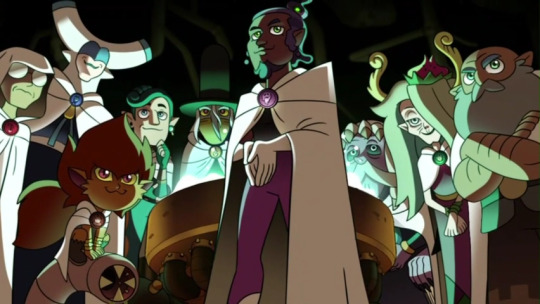
and tbh i think this scene is meant to be taken more 'symbolically' as a hint to the audience that there is something different with the Bard Coven Head's reaction, rather than what was exactly happening in-universe. But if they were indeed just facing the Emperor frowning i feel like it would be something Belos would notice - and it could have been something to add to the developing conflict (in the narrative sense, not, like, a direct fight) between them if only there was ever an actual interaction between the two.
And it would definitely explain why Darius would consider them a bad actor if they did not even try to hide their lack of enthusiasm - although i do think their bickering over Raine's acting ability is taken way too seriously by the fandom when they were just bantering. And i can kinda see a possibility where Raine's acting in s2b had improved after they got some pointers from Darius. (Darius also worded it like he was the reason Raine wasn't locked up even though at the end Kikimora was the one who had captured them - and i wonder whether this was just an insignificant phrasing or Raine was meant to be locked down after the ER, and Darius suggested the plan with the memory loss spell, knowing Raine would be able to counter the spell). Edit: I also like to headcanon that both Darius' and Raine's acting was lacking in different directions - Darius' villainous role was limiting what he could do and who would trust him, while Raine was just way too obvious. So they needed to combine their braincells together and give each other some tips.
Conclusion: what Raine really needed was to grow/to put on a fake mustache or beard to hide the lower part of their face /j
#raine whispers#darius deamonne#toh darius#the owl house#toh analysis#toh rewatch numericalbridge#(Eber has the best pocker face though)
29 notes
·
View notes
Text
OFMD Spiral Narrative Analysis 50: Beards and Unconditional Love
Intro: What I love most about how season 2 builds on season 1 of OFMD is the spiral narrative structure. Ground is repeatedly and explicitly re-trod from season 1 to season 2, but in season 2 everything goes deeper than season 1. Meanings are shuffled, emotions are stronger and truer, and transformation is showcased above everything. The first season plucks certain notes, then the second season plucks the same ones--but louder, and then it weaves them together to create a symphony.
---
In season 1, Ed's beard is a visible determinant of his identity--he's literally named Blackbeard after all. But as soon as we see even part of Ed's face, the show also immediately signals that Ed's identity as Blackbeard doesn't line up with his identity as a whole: his beard isn't black.
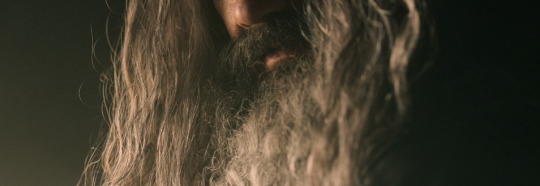
Only the mustache is black. Ed's literally outgrown being Blackbeard, and his internal tensions around his sense of self are literally right there on his face.
The beard does the same thing the identity does: it shields Ed, protects him behind a persona just like the beard keeps his face warm. It hides his emotions, dampens his facial expressions so he's harder to read. And the beard is also a trap, something he's stuck with at all times, just like his Blackbeard persona.
And then it's just gone.

And Ed is so disconnected from that loss, just like he's been increasingly disconnected from the Blackbeard persona, that he doesn't even register why Stede is surprised to see his normal face.
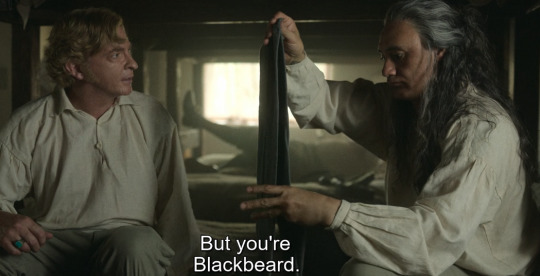
And the shift in vulnerability is immediate, and striking. And Ed welcomes it, because as he says "that was over years ago." He's past that persona, past the part of his life when he wanted to project power and hide his face. At least, he is right now.
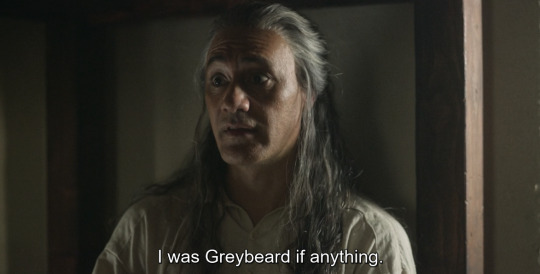
For Stede, this is a startling and not entirely welcome development for two reasons:
It unexpectedly shifts and intensifies his relationship with Ed. Ed and Stede don't actually talk about their feelings until the beard is off. This is a big deal emotionally, and Stede's already drowning in emotional turmoil.
Because he thinks it's bad. He thinks Ed has lost something important, no matter what Ed actually says to him.
Later on, when Chauncy is accusing him of being a monster, Stede thinks back to the moment he saw Ed beardless.
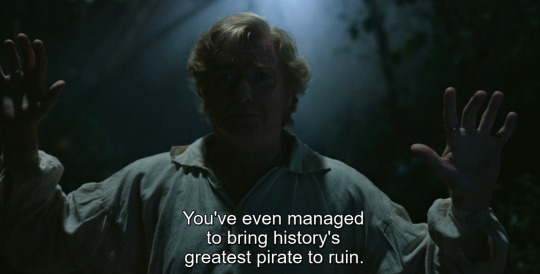
To Stede, Ed's beard disappearing is an exposure. To Ed, it's a liberation--and one he doesn't actually connect to Stede. He stays vulnerable when he returns to the Revenge. His thinking on the hilltop wasn't just about Stede, it was about himself, too.
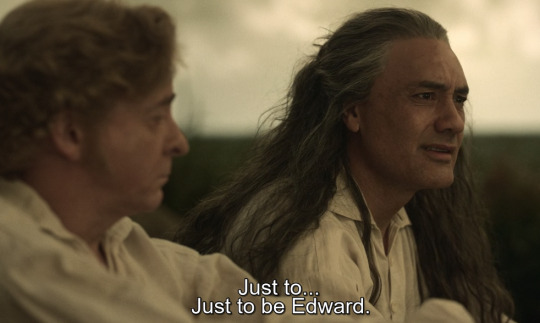
And he doesn't want to change backwards, even if Stede's left him.
And it's worth mentioning at this stage that a beard is a time-honored euphemism for faked heterosexuality, and when Ed comes back to the Revenge he's both beardless and wandering around in a pink flowery nightdress left over from his boyfriend. Not to mention his physicality here--it's just noticeably more queer-coded than at any time before.
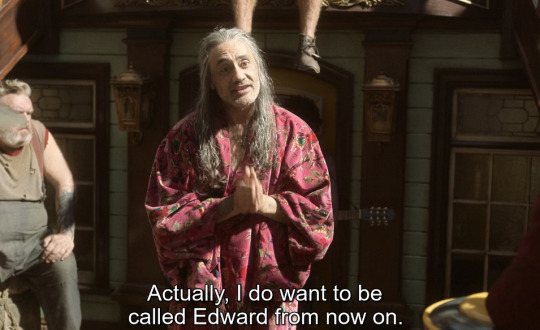
Ed is developing an identity that doesn't require his beard...except that he's also not shaving. He's got the stubble there from the beginning. The foreshadowing of his impending regression is right there on his face.
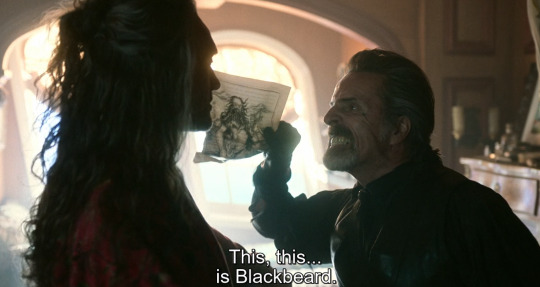
So when Izzy pushes, Ed falls.
But the thing about growing backwards is, you can't. Just like Ed can't will a beard onto his face when he decides to embrace the Blackbeard identity.

So, he draws a beard on. An actual black beard, a symbol of how he's trying to be more truly Blackbeard than ever before, trying to force himself into a monstrous and therefore unhurtable (and unlovable) persona.
And the "trying too hard"+"this is unhealthy" notes of this new beard are immediately obvious. He doesn't just draw a beard on, he goes and paints his whole face, like he's trying to make the "beard" consume him.

But he can't go back. This is just a surface layer, easily removed whether Ed wants it to be or not. He can't escape himself, or his pain. All it takes to remove this beard is a bit of water.

In the second season, he's still using the makeup to darken his face and beard.

But the layered meanings are deeper here, again, because he isn't shaving under the makeup to keep a perfect, fake black beard. He's growing a real beard that's mixing with the fake beard: this phase of his life--as he tries to be Blackbeard and over-corrects, hurting everyone around him--is going to stay with him.
In the first season, Ed couldn't just go back to being Blackbeard; in the second, he can't go back to just being Edward. That moment has passed, if it ever was that simple in the first place: his relationships to others and to himself are permanently different in season 2. He doesn't shave this season, and keeps a short beard the entire time.
But after all the fuss in S1E9 about Ed's beard being gone, there's one more episode where that transition is brought up again.
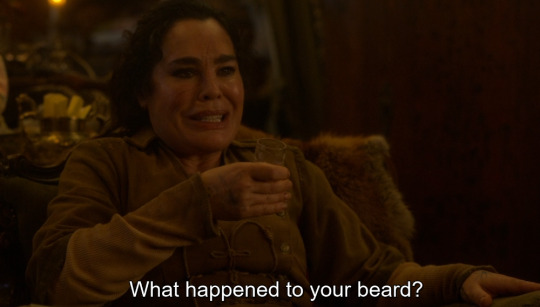
Mary doesn't much like Ed's loss of his beard--which makes sense, considering she's about to go back to pirating herself, and Ed losing the beard was a symbolic separation from piracy.
Ed's response, meanwhile, illuminates very clearly just how badly Stede hurt him. Ed shaved that beard off because of Stede, become vulnerable because of Stede. And he's lying about immediately regretting the decision, and Stede knows it. Ed's telling Stede that his current opinion on their relationship matches Stede's fears back when he bailed out (that he brought history's greatest pirate to ruin). That to him, the whole thing was a mistake.
Stede doesn't believe him, but it does hurt, and it does highlight the consequences of his carelessness back in season 1. Stede made Ed regret being vulnerable with Stede; he hurt Ed so badly that Ed gave up on himself.


And Stede owns this. And he deals with it, and weathers it, because he wants to make this work with Ed.
And you can't go backwards--but sometimes you can circle back. Ed's hurt over dinner sends him back emotionally to where he was right after Stede left--almost literally.
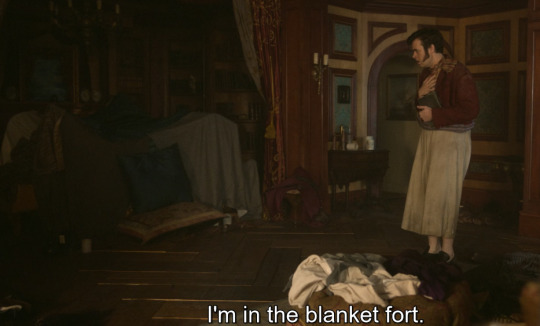
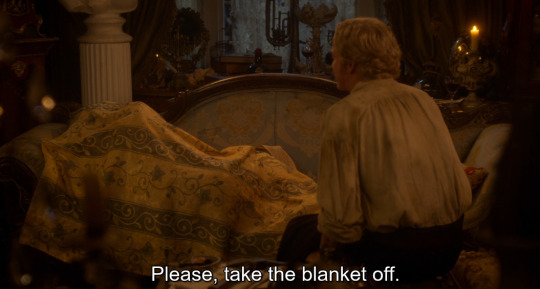
As Ed and Stede talk through it, Stede connects Ed's beard directly to the intensity of their relationship in that moment and how it made him panic.
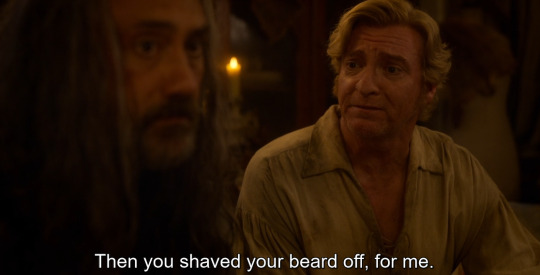
And Ed voices the insecurities he's been building up ever since that conversation with Izzy: that his vulnerability without the beard was somehow wrong, that Stede's leaving was a rejection of that exposed self, and proved how unlovable and worthless he really is.

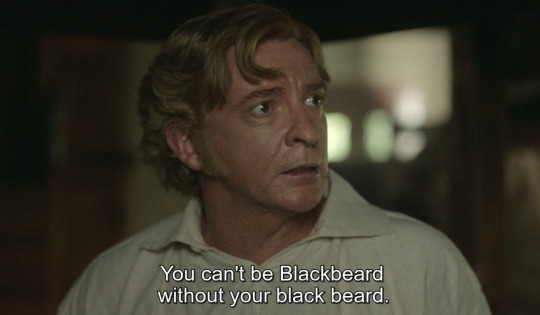
And Stede overrides all of that. When Stede first saw Ed without his beard, he was horrified over what it meant. He was an idiot being controlled by his own insecurities. He's grown since then, and he knows how he feels, and who he's talking to.

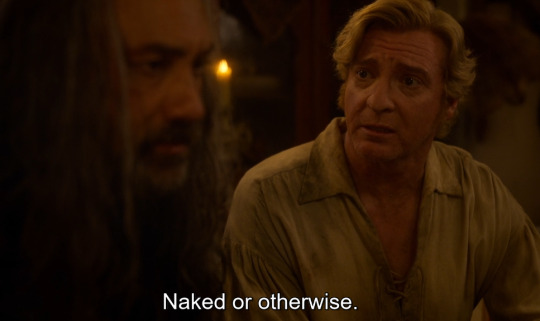
Stede and Ed deal with a lot of shit in this season, and find that their love requires serious work. But this here? This is a statement of unconditionality. Ed, Edward, Blackbeard, the kraken; Ed embracing one identity or balancing between several; Ed with a big bushy beard, no beard, or a short beard: Stede loves it all.

Ed doesn't really believe this when he hears it. When he leaves Stede later, he says "fishermen and pirates are nothing alike." It'll take him a while to trust what to Stede is a simple truth--after all, he doesn't love everything about himself, how could Stede? But Stede knows now that a beard is just a beard.
#ofmd s2 spoilers#ofmd#ofmd s2#our flag means death#ofmd spoilers#ofmd meta#ed teach#stede bonnet#blackbonnet#sidebar: i'd bet a lot of money that the inn is going to burn down at the end of S3E1 (if we should be so lucky)#overanalyzed facial hair
29 notes
·
View notes
Note
No because the way they brought Gerrard back was so disrespectful like I know it's been a while but is he still racist and sexist and homophobic or did he change but still remain a power tripping asshole? How does that make any sense? I feel like there's no respect for the fact that he wasn't just a bad captain like when chimney was captain, he was an outright bigot. If they didn't want to have their characters openly facing bigotry in a lighter episode, they could have at least had them talk about what it was like before and how Bobby was such a relief for that reason or have Gerrard make some kinda "Oh you can't say anything these days so I'm keeping my mouth shut" comment. Not that I necessarily *want* to have these characters face bigotry, but I think it would have been an interesting dynamic to show the change that hen talked about in hen begins where the 118 really was a boys club in the most classic sense and her and chimney were seen as interlopers and it took a while for them to form solidarity but now literally all the main crew are minorities and buck is the only white person and they're all supportive of each other like it was so weird to make buck the only one to be like we should stand together and all quit and he's being picked on for being...sensitive I guess? Like it could've been an interesting conversation about his role as the only white person with a white captain or his newly discovered queer identity or just anything deeper and more meaningful than the literal cartoon mustache twirling villain they did instead.
yeah i hate how they turned gerrard into more of a cartoon villain in this season and the last episode felt like a kick in teeth showing him mourning bobby more than some of the main characters, i get that the actor is actually a nice guy and thats probably why they keep bringing him back but when it just doesn’t make sense narratively or for the characters it’s just shoehorning him in without thinking of the ramifications or his previous characterisation, his role in the whole ortiz storyline was weird as well
4 notes
·
View notes
Text
Deep Dive - Dragon Age: Absolution
Part 1 - Turnabout's Foul Play Part 2 - Gilding a Thorny Rose
Part 3 - Blood Keeps Telling
One of the most common criticisms I see of DA:A is with its big bad: Rezaren Ammosine. He's a Tevinter Magister, a white slave owner, a man at the top of an awful and oppressive power structure, who indulges in that privilege and directly, intentionally perpetuates its horrors even while doing the mental backflips to convince himself that he's a Good Person...™️
That last part is always where the issues I hear come in. Rezaren, like most awful people, is the hero of his own story and he portrays himself that way. He's a consummate sadboy with a conventionally attractive waify face and every single thing he does he has a rationale for. Some conflate this with authorial intent, or what the tone of the narrative has to say about him. I've heard claims that he's too charismatic, too sympathetic, all sorts of versions of "not awful enough" as if he's being portrayed as any sort of a good person. Except that's an incredibly surface level read. The way he acts and portrays himself is a greater condemnation of how awful he is, and amongst that being signaled again and again through his actions and others' commentary on him, there's one line from the man himself that is the lynchpin of his entire character:
"Only if she doesn't cooperate."
Every single time he's challenged, Rezaren's veneer of civility lasts only until the moment he's told "no." It happens over, and over, and over again the whole story long. It starts with little things. He doesn't want to stop researching his obsession, so he reasons and complains until the Templar who loves him caves in. He doesn't want to stay in his room, so he mind controls his corpse puppet "brother" out of his way. He wants to contact Miriam, so clearly blood magic is justified. It's only a few drops. Miriam refuses him, so he switches to "a language she'll understand" and tortures her. In the end, when he decides to "take back what's mine," he turns to murder, blood magic, enslavement... there is no depravity too low for him if it stands between him and what he wants. For all his talk of family, of purpose, of a greater future, the nice guy act is a carefully crafted persona. When the chips are down he will commit any atrocity because to him it is a restoration of the natural order.
This is what makes him so... upsettingly real and visceral. I've got conservative family, I grew up with them, this is exactly how they act. Oppressors don't wake up in the morning twirling their mustaches scheming about how they're going to hurt people. To exist as one you need a justification, you lean on your own persona to keep yourself going. Civility, manners, "niceness," how things should be: those are the things oppressors need to believe to perpetuate their social order. But in the end it always comes back to a threat. Defiance is met with violence in equal measure, to keep the oppressed in check. That truth is what Rezaren's whole character revolves around. It doesn't feel like much of an analysis to say any of this, to be honest, so much as pointing out the obvious and textual... but it gets overlooked enough that it feels worth highlighting. More importantly though, it also informs Miriam's particular brand of trauma. Ripped away from any family except her brother, growing up under abusers who told her in one breath that she was surrogate family to her "owner" and in the next that she was property, it's no wonder she struggles so much with community and finding a place of belonging. It's no wonder she's such a mark for Hira, another Tevinter noble who lured her with the promise of love and care. It's no wonder that even a stupid showing of unequivocal care from the team touched her the way it did, and no wonder she sticks with them after the adventure is over. Belonging and personhood was ripped away from her, and dealing with that pain was the basis of her story. ------------- But I'll save that can of worms for my last post, where I finally get to Miriam herself in...
Part 4 - An Unbreakable Broken Heart
5 notes
·
View notes
Text
ALRIGHT TUMBLR I HAVE FINISHED DRAGON AGE THE VEILGUARD
AND SO I RETURN
and here are my thoughts under the cut, WILL CONTAIN SPOILERS so don't click unless you're ready for that.
messy AND VERY LONG thoughts on the game in no particular order here we go:
y'all i am so torn about this game. i don't love it. i REALLY wanted to love it. I went in with a truly open mind and honestly pretty damn hyped, nothing i had seen before release had managed to taint my opinion going into this. but i did not love veilguard. I didn't necessarily HATE it either, but it's the type of game i really am not sure if i'll ever be able to bring myself to replay.
For those interested it took me roughly 90 hours of playtime to finish the game (have not counted me playing the character creator for 4 hours into those 90 hours lol... lmao....). I have done every quest (except for 1 very minor side quest when at the end i felt fucking DONE), I have explored not 100% of every area but like 85-90% of all statues and chests and shit found in all areas. And I have 92% of achievements in that first playthrough. So I was fairly thorough cause I could tell I might never touch this game again but I'm not a completionist.
My Rook is named Valeria de Riva and she's an elven rogue and an antivan crow. And I love her face to bits she's short and adorable, those 4 hours in character creator was worth it lmao but oh boy do i regret the voice I picked. i'm sorry but Erika Ishii's voice acting did NOT click for me in this, the delivery felt terrible 85% of the time. but I have that problem with inquisition too so whatever.
I also had headcanoned that Valeria de Riva was originally born as a slave in Tevinter, and bought by the Antivan Crows as a kid. As we've been told since origins that the crows buy kids (see Zevran). BIG FUCKING MISTAKE to make headcanons like this for veilguard. nothing about Rooks antivan crow intro contradicts this kind of headcanon but the game will randomly spring information about your character on you depending on background you've picked, Rook isn't a blank slate but you also don't get to know what character you're fully playing from the start which annoys me.
The antivan crows have also imo been extremely.... idk?? softened?? white washed???? and that frustrates me a lot as someone who wanted to play a character that was a little bit at war with the faction they were from. It annoys me that the antivan crows are now just freedom fighters and heroes according to the narrative and you have no chance to ever question how they do things. it also feels like a weird thing to say but there is too little racism in this game. by which i mean we finally get to see Tevinter and we don't really ever get to see how elves are treated within Tevinter. The only slaves we ever see are the mustache twirling evil venatori sitting on some poor dudes in that one scene.
which bring me to the fact that THERE ARE NO INTERESTING VILLAINS IN THIS GAME. none. (Besides Solas, depending on if you see him as a villain or not I guess.) everyone is just evil and crazy. I'd have loved Elgar'nan actually as a villain, and I'm fine with him (and Ghilan'nain) specifically being evil and crazy, he does come across as imposing and scary to me and a better villain than corphypants. BUT SINCE EVERY FACTION WE FIGHT AGAINST IS JUST CRAZY AND EVIL, it kinda falls flat to me. I'd have liked to see more people side with the gods for more ambiguous or misguided reasons I guess, like maybe the elves?
I wanted more conflict and tension between the races of thedas from the fact that the elven gods are the ones causing all this. some consequences from the narrative? but there's nothing like that.
the writing is in a lot of places at best bland and at worst... bad. i love how much we get to interact with our companions in the lighthouse and that they have their own relationships and conversations, but quantity does not beat quality. I'd love this system of having conversations if the companions and the romances were more interesting. A lot of the companions feel bland to me cause they start out mostly perfect from the get go, there's not a lot of room for character growth or you know... any form of character arc?
I romanced Taash and it's an alright romance, I like Taash. and I guess the reason I like them is cause they are one of the few companions that aren't perfect and I've already seen Discourse about hating them for it. I guess sometimes they are A Little Bit Difficult??? They're not sure who they are at the beginning and isn't great at expressing themselves, they have very short responses and I felt at least in the romance path they learned to get a little bit better at this with Rook. But I really wish this could've been expanded on MORE, their problems with dealing with their emotions are just something they mention to Rook but it's not really shown.
AND ALSO... despite the game being more 'handcrafted' with 'less filler'.... I STILL think it has too much fucking filler and boring quests??? the combat was fun in the beginning but overstayed its welcome imo.
BUT AFTER ALL THIS DISAPPOINTMENT.... I still leave the game with an alright feeling I guess cause what I DID ENJOY OF THE GAME WAS EVERYTHING THAT HAD TO DO WITH SOLAS. INCLUDING THE ENDING THAT I GOT. I think they nailed how to do him in this game, and his dynamic with rook, and the lore around him and the ancient elves and the titans etc etc. I'm extremely satisfied with the happy solavellan ending I got and it felt fucking good to have the three important women in his life (lmao) convince him to redeem himself. and that he didn't get an easy way out, like dying for that redemption.
SO THIS IS THE FIRST TIME I THINK I'VE EVER EXPERIENCED MOSTLY KINDA DISLIKING A GAME/FINDING A GAME BLAND BUT LOVING THE ENDING???? usually it's the other way around with bioware games??? so... yeah.
#da:tv spoilers#dragon age the veilguard spoilers#removed previous post and edited some mistakes i'm sorry djshfjsdf#i fucked up#pulling a bharv
2 notes
·
View notes
Text
House in Fata Morgana: Door 6.75
I have never reviewed a visual novel before, but iscahwynn made me a very generous offer and a long line of patience, knowing that we are trying something very new. To that end: Please don’t spoil me for the game at all! If you are reading this, I have only gotten through the part written above, and I don’t want to be corrected, even if I’m wrong, even if I’ve missed something, i don’t want to have anything confirmed or denied, and I don’t need any trigger warnings or extraneous explanation. Iscah would like my pure, naive experience of the game. Thank you!
Okay so I absolutely did not make it to the next door, which is frustrating for me from a scheduling standpoint, but makes sense narratively, I should have trusted that the door situation was streamlined and that’s on me.
So, let’s first get aside all of the notes about Morgana’s life. It much the way it frustrated me with Giselle, it frustrates me that none of Morgana’s problems can be a result of her own actions, or feelings, or whatever. I feel really fucking bad for her, but in the sort of way you do a kicked dog, not a human being you feel empathy with. She acts like a fucking saint, it is very difficult to think of that sort of person as being a fully realized human. BUT, I do love that we meet with Mell and Yukimasa and Jacopo, though of course owing to the shortness of the story but, they’re all very mustache-twirling and not nearly as interesting and layered as I found their stories within their own doors. But I think that’s fair.
Couple standout things here for me: I am not so sure that she doesn’t have some sort of power, but I also think the argument she doesn’t is completely legitimate, and I love that! I love not really knowing, certainly not every person who ever had a torturous life and horrible death gerts to wreak fucking havoc, i’m just saying. But I love that it could just be sheer faith, in both love and hate.
The way that she cuts herself, and people love her and praise her for it, and so she comes to cherish her hurts and cuts. Loved this as an example of the ways that, in how we online socially reward sadness and brokenness with attention, contribute to this idea of cherishing our hurts. This isn’t me saying that we should never share anything that sucks online, but I think all of us are pretty aware of how responses to a creative, or happy post can be versus a post about something bad can be, and I think that can be reinforcing, and you start to see those as immutable parts of you. Anyway, send hatemail, it’s fine.
BUT WHAT WE’RE REALLY HERE FOR. Okay so I called Michel being Michelle but I have to confess, “Michel is a trans man” (Kinda????????? I guess???????? I don’t fucking know, he says his body is male now and that was not strictly speaking possible in 1099, so unless there was magic involved or he’s being metaphorical or something here, I have no idea what’s going on) is NOT where I expected the game to go and I am sucking my TEETH with nervousness about how they’ll handle this. All of my reticence for Michel and Michelle being the same person comes out of my fear that they will handle the gender thing so so so badly, and I still absolutely feel that way.
I am pleased, I guess, in a narrative sense, that they have Giselle respond in a reasonable and common way for a woman of her time, and honestly, all the times she’s lived in. I expected full on “Bodies don’t matter to me <3” which does annoy me in “historical” fiction. Of course it happened, but it was not all that commonplace, and it’s just something that grates me. So even if she comes around, and I suspect she will, I’m glad we got to avoid magical cool girl from 1099 Giselle. She had a reaction that feels bad and is historically plausible as shit. We love that! Gives her room to move and makes everything feel less fake.
Also, did Michel seriously think he was never going to have to confront this KID, COME ON. For someone who has built up a shield of never trusting anyone around yourself you sure are trusting that Giselle is going to this thing that she could not reasonably have seen coming REAL FUCKIN WELL. It’s such a part of the contradiction of Michel. He’s closed off, he’s vulnerable. He’s cruel, he’s tender. He’s intelligent, he’s A FUCKING MORON. I love him! I am going to punch him in the fucking face!
ONTO DOOR 7 FOR REAL I GUESS
8 notes
·
View notes
Text
It's an interesting point! I've never seen a detective story improved by a writer spontaneously inserting a tragic backstory.
I think one reason it only ever seems to impede the narrative is that it feels like it's answering a question nobody was asking - "why does this detective solve mysteries?" Because that's an intrinsic, foundational part of the genre of detective fiction, and therefore what I signed up for when I picked up the book.
Not only that, the answer an inevitably tragic backstory volunteers to that question is automatically self-centered and kind of robs them of agency in the decision to pursue mystery-solving. They unravel unresolved mysteries because they are themselves haunted by something unresolved! Something happened to them and that's why they're Like That! So it's not about the cases or the people they're helping, it's about the detective feeling bad because something bad was done to them by someone else who actually had agency.
It's just as explanatory and potentially more interesting from a character standpoint to let the answer to that question be "because they think they're interesting" or "because they want to help people" or "because they're bored and it's cheaper than cocaine."
It also pulls focus off the complexity of the mystery and onto the detective's New Complex Past, which means it's not what a mystery-loving audience is coming to the story to see. It's a similar effect to detective stories inserting action sequences or high-octane chases into mysteries that didn't originally have them. It kind of indicates that the writer doesn't believe the mystery on its own is interesting enough and needs More Bullshit to hold anyone's attention.
It doesn't help that most added-in-post detective backstories are hackneyed at best and insultingly dumb at worst. I still get tickled every time I remember Branagh's Poirot invented a tragic backstory for the goddamn mustache.
The temptation, when adapting a really iconic detective, is to delve into his personal backstory. That's the devil talking.
53K notes
·
View notes
Text
OK, let's do this one more time....
NEW THEORIES for the "Beyond the Spider-Verse" after seeing "Spider-Man: Across the Spider-Verse" a second time...
1 ) We're setting up a whooooole thing where Prowlers are the dark mirrors of Spider-People
2 ) Miguel's got claws, as Miles points out with surprise, because he's not a "Spider-Man" originally, he was a Prowler who saw that Spider-Man had died in another universe and took over his life and his identity. The fact that Miguel began as a villain has compounded his sense of guilt over that universe getting destroyed and his adoptive daughter being unmade: he was never supposed to be there in the first place. But he has since developed a strong sense of right and wrong based in that trauma and is sincerely trying to be a better person / save the universe.
3 ) This is going to be important because Miles G., the Miles Morales from Universe 42 who is now Prowler, is going to pull the same stunt. That's why he asks if Jefferson, Miles' dad, is still alive in the other universe. Miles G. comes from a shit universe and he feels robbed (or he will) when he learns that original Miles has all the happiness he deserved. He's going to lock up original Miles in his universe and go to take his place, just like Miguel did. This puts Miles in the further awkward position of needing to parrot what Miguel said about how disruptive Miles G. going to his universe and disrupting his life would be.
4 ) There are numerous clues pointing towards this "You become Spider-Man or you live long enough to see yourself become the Prowler" dichotomy where there's more than one Spider-Man who was once Prowler. Hobie Brown is canonically a Prowler, originally, who impersonated Spider-Man. So hidden in Spider-Punk's name is this set up for the dark and the light side of Spider-Man being Prowler. But also hidden Hobie Brown's character is the fact that you don't have to stay Prowler. With a little dose of anarchy and bucking the system, the original thesis of Spider-Verse is reasserted: anyone can wear the mask. Even Prowler. Even a villain.
5 ) Miguel is not actually entirely wrong. We are going to tragically learn that for all his villainy at the end of ATSV, he's still an antagonist, not a villain. On the re-watch it really stuck out to me how much he's not a mustache-twirling villain. He's not being a jerk for the sake of it. He's traumatized and he is, genuinely, trying to help others and save other universes.
Most interestingly of all the narrative has not proved him wrong yet. For all Miles' optimism about altering the canon, he's not been proven right yet that disaster can be prevented. We didn't see Pavitr Prabhakar's Mumbattan get rescued! We don't know if Miles was right yet! Gwen's dad might be saved because he resigned the badge, but just rescuing them might not be enough. Miguel might still be proven right or, more likely, something more complex needs to happen to alter the canon without risking disaster.
6 ) Part of the lesson Miguel is going to learn is just because he was once Prowler, doesn't mean he was damned by the narrative for taking Spider-Man's place. He can still wear the mask. Anyone can wear the mask. IMO, he will be redeemed along these lines but we are going to learn about his guilt and sense of being a Prowler who doesn't belong among Spider-People and how he's overcompensating to overcome that.
One reason being that if he's some other villain, like Venom, and his intentions were to destroy the Spider-People of the multiverse, which I originally suspected, it means every single Spider-Person got duped, which is hard to believe when they're all heroes. IMO, the only way to trick them all from a narrative morality standpoint, is if Miguel is sincere and really is a Spider-Man trying to make the world a better place. Then the other Spider-People's weakness isn't being stupid, it's that they gave in to the sense of being doomed by the narrative, of despair, that they couldn't try to save the lives and lessen the tragedy of their multi-verse counterparts.
TL;DR - Next film we're getting Miles G. trying to steal Miles's life, while Miles is also trying to save his dad's life and stop the Spot. We're going to learn all about how over and over, it's Prowler vs. Spider-Man/Person, how Spider-Man can become Prowler, how Prowler can become Spider-Man, how you're not doomed to be a hero or a villain, that anyone can be Spider-Man, and indeed, we're gonna get some redemptions. Miles G. is almost certainly going to become Spider-Man in his universe by the end. Miguel is going to possibly get his family back and learn he can be Spider-Man without guilt. We're gonna learn how to save the world, save Uncle Ben, and not disrupt the canon. We're going to learn that the Spider-People are stronger together and that the only way to be doomed by the narrative is to give in to despair.
Ok, I think that's all I got for now!
Edit: OH, PS!
I'm not convinced that Miles G. is actually a bad guy. A lot of his scoffing at Miles and a lot of Uncle Aaron's scoffing at Miles is very ominous but it could also be them laughing because Miles is telling them they don't have to be bad guys.
But for all we know, Prowler and Uncle Aaron might be the only ones protecting New York from the bad guys! They might be angry at Miles for insinuating that they're bad guys when in truth they're busting their asses trying to save the world.
That still doesn't mean that Miles G. is going to like Miles. He might be pissed off at him, actually, for robbing him of the super powers he was supposed to have that would make his life easier. He might still want to steal Miles's life! But on the re-watch I a much, much less convinced that Miles G is actually a bad guy and not that we're supposed to think he is because we're seeing the scene from Miles's point of view, and he's scared and alone and seeing enemies everywhere. Miles G. might actually be a hero in his universe and it's a bait-and-switch.
58 notes
·
View notes
Text
I just finished Adastra and I am about to make that everyone's problem
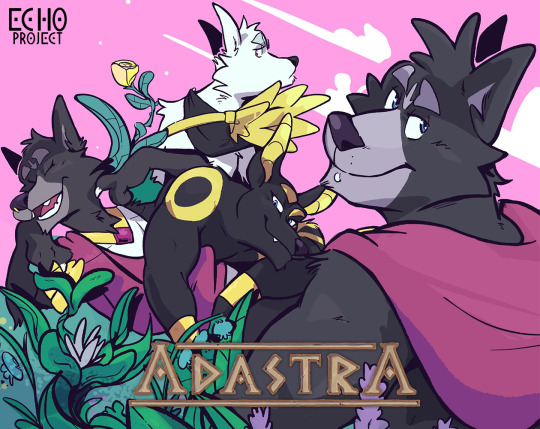
Tldr: it slams and (if you are over 18) you should play it
Disclaimer: Adastra is an 18+ VN. There will be no nsfw content in this post but like. If ur a minor get outta here
This isn't a liveblog, since I already finished the game, but it's a pretty similarly scattered collection of my thoughts while playing so there's no real narrative cohesion to this post. If u were looking for a detailed review just watch the video by Boringkeith
I think the biggest thing about the game to me is how insane the plot gets at Act 2. Act 1, while admittedly kind of dull, does a great job at setting up characterization and tension over time, introducing motivations and worldbuilding in a really natural way. The way the author handles the delivery of information is just. Fucking fantastic if I'm being honest, and the conversations-- ESPECIALLY arguments-- just feel so natural. There's a great tension and release that the game has, and it's a really gripping story. I think writers like this shine in this medium because God. GOD. the dialogue is good. Then Act 2 happens and shit hits the fan and does not STOP hitting the fan until the poor thing is bowled over and unplugged from the wall. Genuinely unhinged, the pacing is breakneck and it is GOOD
The protagonist actually being their own person was also fantastic, and honestly one of the only ways I can see this story going. Despite inevitably being a romance VN with intertwined political drama, I never really felt myself occupying the protagonist (Marco)'s role too much, and this is for the better. Ultimately, Amicus (the love interest) is perfect for Marco, but not for me. Neferu is hotter anyway. But Marco? Amicus??? Those two dumbasses are made for each other. Plus, the actual codified personality of the protagonist allowed for a great deal of information to be presented and withheld in ways that wouldn't be allowed by a blank slate protagonist. The dynamics wouldn't have worked as well either, and I think the story is all the more engaging for it. I, personally, would have been more lenient on Alexios but Marco? He wants that twink OBLITERATED
Cassius is the funniest character in this game I think. He just reeks of like. Loser redpilled 17 year old projecting all his insecurities into the incel takes imaginable. I'm going to wring him out like a wet paper towel. Yes he's a borderline space fascist but I can fix him I swear. When he hotboxes and trips so hard he sees God, only to have God call him a cringefail loser and he starts crying about it? Yeah that's babygirl material. Pathetic beast
It is very funny to me that the game has to spend 80% of its runtime trying to convince you that Amicus would make a good emperor and explicitly has rules in place to say that females can't rule because you KNOW within 15 seconds of her opening her mouth that Virginia is the un-debatable best choice. The fact that Amicus doesn't immediately give up his throne for her is his biggest flaw
Cato is kinda one note but he is supposed to represent heternormativity and the pitfalls of bigotry in this giant scifi queer allegory so he gets a pass. I'll admit I found him to be a lil too mustache twirling snarky towards the climax, but eh. Also I'm dead convinced that the parents meddled with him. He started freaking out when his visor got taken off and acted more erratically now that he lost his parental tech (hm) and also him crashing the parents' ship was totally out of line with his motives even as mentioned by other characters. The parents def manipulated him I can feel it
The Parents are sus as fuck I will stand by this. The game really makes you want to choose the option of trusting them (and I did bc I just want Marco and Amicus to be happy) but like. Fuck man. They mad shifty I don't trust like that they got some other shit going on. BoringKeith says more than I ever could about it just watch his video
For personal reasons I am furious about them not showing the ram civilization. We know about four of the civilizations (greek cats, roman wolves, egyptian jackals, and indian tigers) but like. What about the rest? Based on the little we've gotten it looks like the bears are norse and there are rams but I don't even remember the other two. What are they I want to see them
My only mark against this game is that both of the disabled characters are evil. I don't think there are any non-villainous disabled people which kinda blows. I heard Echo is better about it which is good? but even still it left a sour taste in my mouth
The art? is really good??????? I love the expressions and the way the CGs look especially. Fucking fantastic
The themes of homophobia in this game are ROUGH and really really raw. Again not gonna talk about it much here watch the boringkeith video but Woof. This game is so good I highly recommend
Go play Adastra
20 notes
·
View notes
Text
Stillness is wildly impressionable when she sees memes, news at 11.
Read @robotlesbianjavert's post she wrote in reply to me asking her about her favorite Gay Little Henchmen and immediately had to do my own. Added some runners-up also. Sorry for the nonsense, all.
#5: Lieutenant, The Legend of Korra—
Surely in my ranks of "characters I like most wildly out of proportion to their importance in the show," but that's what a good mustache and an emotive delivery on a last line will do for you. It probably doesn't hurt that, despite the Lieutenant never even getting a proper name, that one last scene gives him more chemistry with Amon than Korra had with Mako the entire season.
Anyway, I liked him in the show and definitely went out hunting for fic/art for the pairing based just on that, but I do have to give a shout-out to @scumtrout for her fic The City Will Follow You for keeping the fire burning for this poor sad asshole. Give it a read if you want, among other things, the Lieutenant being sad and fucked up and incredibly dangerous as he processes how Amon used him and the rest of the Equalists.
#4: Shirato Jin, Persona 3—
The littlest of the little henchmen on this list for reasons of being a teenager and a computer nerd (but still a dangerous criminal because I know what I'm about). Jin is like if Skeptic were a decade younger, staving off a terminal disease with illegal drugs, and was a little less goth and a little more rave. Also, packing a lot more grenades.
He's got a good balance with his cult leader of choice wherein Takaya is the one prone to big, dramatic actions to emphasize his rhetorical points, while Jin has to be like, "Hey, I agree with all your rhetorical points, but I also want us both to survive long enough to savor you being right about everything, so let's exercise the better part of valor here." In that way, they're on the more equitable end of the power dynamic spectrum pairs like these run.
Strega in general got handed an incredibly raw deal, both in-universe and in terms of the broader narrative, and boy oh boy are they ever a good predictor for how hard I fell for the League of Villains.
#3: Tadashi Kikuchi, Sk8 the Infinity—
Soft-spoken manservant designed to look like a background character compared to the rest of the cast, but efficient and skilled in the wildly different spheres of Illegal Underground Skateboarding Park Management and Upstart Japanese Politician Personal Assistance. Tadashi is kind of terrifying when you really stop to think about him, not just for how scary competent he is, but for being, in his own way, just as unhinged as his boss, but ten times more oblivious to that fact.
He's a henchman willing to act out for what he thinks are his boss's best interests, and it is extremely hilarious how much of Sk8's overarching plot is caused directly or indirectly by Snake and Adam's relationship drama. Incidentally, Tadashi is a rare case of a Gay Little Henchman whose feelings are requited! That mostly serves to make things more complicated, however, because the feelings in question are, "I could never, ever leave him, but I think he's really fucking me up."
#2: Nemoto Shin, My Hero Academia—
Of all the candidates BNHA offers for this—not a small number—I have to give it to Nemoto for scoring the best across all categories. Transparently only there because he fell for Overhaul like a wing snapped off an airplane. Absolutely zero other motivations. Knows about Overhaul's evil plans and horrendous crimes, and 100% does not care. Not only is he a henchman, he denigrates other henchmen. You just know that if he could do all the things his boss needs done on his own, he'd run the rest of the underlings out ASAP. Absolute top tier The #1 Henchman Here Will Be Me energy.
#1: Tomo, Fushigi Yuugi—
Tadashi is nearly a match for him in terms of, "Yes, it's canon," goes further in terms of not being a predatory stereotype, and is doing better in the reciprocal affections category, too. Still, all that said, Tomo remains my 90s shoujo problematic fave.
He's got a theatrical flair that he gets by virtue of a theatrical background; he's striking in his costume and, for my tastes, the most beautiful man in the series out of it. While the visual quality of the anime runs towards the dubious during his stretch of episodes, he has a purring, silken voice that made Tobita Nobuo my favorite voice actor for years afterward. Then there's the ruthless pragmatism that echoes Nakago's while also going further, because being the boss means you get to set your own hard limits, whereas being in love with the boss means you can go as far as you want while telling yourself it's all for him.
Tomo, like Ashitare and Miboshi, deserved a better and more nuanced portrayal—no shade to Watase Yuu, who was a lot younger when they wrote the series, but FY was the series I learned to love characters out of spite—but I will go on liking them anyhow, because authorial write-offs make me ornery like that.
Runners-Up in no particular order—
Spinner, My Hero Academia: Every bit as homoerotically obsessed with his boss as Nemoto (or any of the other fantastic candidates the series has on offer), but the League/Spinaraki's more equitable relationship means Nemoto's "henchman" vibes are stronger.
Isurugi Camice, Gundam Iron-Blooded Orphans: I love him for the hints of wounded stoicism, which are always catnip to me, but he hides his feelings too well and too long to be an ideal fit for the topic.
Ein Dalton, Gundam Iron-Blooded Orphans: Probably does a better impression of being homoerotically obsessed with Lieutenant Crank than Gaelio, but definitely more Gaelio's henchman than Crank's, so he loses out for splitting focus.
Disqualified For Reasons But I Can't Not Mention Them—
Ivan, Giant Robo: Astounding henchman vibes, and I like him and Alberto quite a lot, but he's not anywhere near obsessed enough with Alberto to fit the bill. Ivan's maladjustedness lies in other areas.
Listor, Hugtto PreCure: JESUS CHRIST, THIS HAMSTER. The wounded stoicism fells me again, and I 100% believe that he and his boss have had sex at least once (LOOK, you don't set up all the repeating patterns Hugtto did with George Kurai and then lead an episode framing him and Listor through gauzy pink bedcurtains if you don't know good and well what you're implying). Still, while I love that awful pairing to death, I don't think Listor is "homoerotically obsessed" so much as he is "unbelievably lonely and in no position to turn George down." If this were my list of Top 5 Wounded Stoics, though, you'd better believe he'd be right at the top.
Uryuu Ryuunosuke, Fate/Zero: His sexual preoccupations are less about his boss than the perverse body horror he and said boss enact on their victims. Which is a shame, because he would rank higher than anyone on this list if "little henchman" were the only criteria. That kid is thrilled—just ecstatic—to be living the life he's living.
Innouva, Magic Knight Rayearth: Given the huge magic wolf form, his vibe is less "pining for his boss" and more "loyal hound will fuck you up." Bitchy gay attitude is fully intact, however.
Lord El-Melloi II: I probably can't count him because I don't actually ship him with Rider, but the evidence of "forever single because he's dedicated his life to living up to his king's final order" speaks for itself. An incredible retainer-who-outlived-his-lord character whose devotion makes me weepy every goddamn time.
8 notes
·
View notes
Text
You’re SO right about the fact that it’s something SMG4’s getting better about. He cares so much about his friends and is trying to be a better friend, even if progress is slow.
And yeah, you’re right, “Mario Loses his Mustache” is a great example of his progress. He puts his silly little video on hold for Mario! That’s big for him. Making silly videos (especially of his Avatar) is pretty much all he exists to do as a meme guardian. (Caine TADC voice: it’s all I exist to do, all I’m… good at) It’s instinctive for him, literally coded into his being. (Makes me wonder about SMG2 but that’s a whole other can of worms)




Something something that fable about the frog and the scorpion. Four is fighting his nature because he wants to be better for his friends so bad.
Another example, I think, is “Mario Gets Stuck as a Gif” because Four is doing that thing where he forgets to respect Mario’s autonomy and feelings BUT he catches himself and stops without needing to be directly confronted AND he spends the rest of the episode trying to help Mario






Especially significant because… he goes to Nintendo about it. And they have the power to take everything from him

I’m proud of him.
reasons Puzzles redemption is possible without sacrificing Puzzles’ entertaining freak behavior I like your theory about the goo! We haven’t gotten much to go off of but that would explain why there’s less of it at Puzzle Park when Puzzles seems to be more far gone. I figured it had something to do with the God box because Niles had a… similar thing going (this show is so GOOD at narrative foils)


I linked the post I made (with discussion from others including the very cool @Vox-exe, just like this post. I love playing pong with ideas as they snowball) about it in my previous reblog, the underlined part about if Puzzles is acting on his own or not. Granted that post began with me talking about the error screen Puzzles has that I have since been informed is fanmade. But it was still included in the show even if it was fanmade initially and wasn’t my only evidence anyway so I think my breakdown still stands. (I’ll link it again just for convenience here. Hope that’s okay)
I also really like your take on the puppet strings. Of Puzzles being both Puppet and Puppeteer of… well, himself. Puzzles is so very
youtube
No control. Full control. He feels like a puppet but he’s the one holding the strings. Self-destructive disaster. Reminds me of the ending of hit Psychonauts 2 level Compton’s Cookoff.
sooo…
WOTFI

THEY DIDNT ADDRESS ANY OF THE PARALLELS AND THEN THEY
INSTITUTIONALIZED HIM

I’m so mad about this. I’m so mad. I’m so mad.
because okay. Okay remember this.

His super dramatic flinch here and there was that post going around like “I wonder what happened in Mr Puzzles’ childhood to make him flinch like that“
CHILD PUZZLES DOES THE SAME THING



EVERY TIME MEGGY/LEGGY APPROACHES HIM HE FLINCHES. HE COWERS. EVEN OUTSIDE OF THE POTENTIAL CONCLUSION HE WAS BEATEN, SOMEONE GENUINELY CARING ABOUT HIM IS SUCH A FOREIGN CONCEPT THAT HE ASSUMES THE ONLY REASON ANYONE WOULD GET CLOSE IS TO HARM HIM.
AND HE’S NOT EVEN WRONG?! THAT’S EXACTLY WHAT HAPPENS?




THEY INSTITUTIONALIZED HIM HE IS TIED TO A TABLE IN A PADDED ROOM. THEY APPEALED TO HIS HUMANITY AND FOUND THE GOOD IN HIM AND THEY USED IT AGAINST HIM.

YOU THINK THATLL HELP HIM? TARGETING THE MOST VULNERABLE PART OF HIMSELF AND GETTING HIM SENT TO AN ASYLUM?
AND IT SUCKS BECAUSE I WAS LEGITIMATELY ENJOYING THE EPISODE BEFORE THAT! I was having fun until that ending. That’s literally the one thing I didn’t like. The scene with Kid Puzzles was really well done. Everybody’s outfits were so cool. IGBP flesh blobs were there that was really cool

but then

I hate this. Genuinely worse than killing him off to me. It just feels wrong
#smg4#mr puzzles#SMG4 (character)#man this post has gotten long and kinda far from the original topic but I like discussion#long post#like really long post#*chatter chatter*#The way you describe Puzzles’ thought process at the end of your post reminds me of Wheatley
180 notes
·
View notes
Text
utilitarian thought experiments in narrative have this problem in general, which is that clean and necessary tradeoffs don’t actually exist in our world or any world that’s sufficiently interesting to tell a story in, and people are always arguing that their reprehensible action is an unavoidable means that justifies a very good end, on much less than the 100% certainty some tradeoffs might demand. less “push a fat man in front of a trolley to stop it” than “our policy experts argue that if we continue to kill a couple hundred fat men a year, pedestrian deaths due to trolley mishaps may decrease by up to 15%, but a significant minority of experts disagree and claim our experts are just shills working for the trolley companies to explain why they don’t need to implement safety standards on their inexplicably deadly trolley cars.” even trivial thought experiments like this are hard to translate into convincing narrative, because it’s hard to tell a story about these tradeoffs that really make you feel like there’s no other option.
though at one remove this can be turned into stories are that aren’t directly about the tradeoffs, but about how and why people convince themselves they’re making the right tradeoffs, which is what “A Taste of Armageddon” does, funnily enough (though I think it should have explored this theme more, rather than just alluding to it a couple times). Usually ends-justify-the-means villains fall flat, bc the means and ends are both stupid and often only tenuously connected, but one reason “A Taste of Armageddon” works is that the villain is institutional inertia and a society conditioned to believe in the necessity of war, not a single mustache-twirling villain.
22 notes
·
View notes